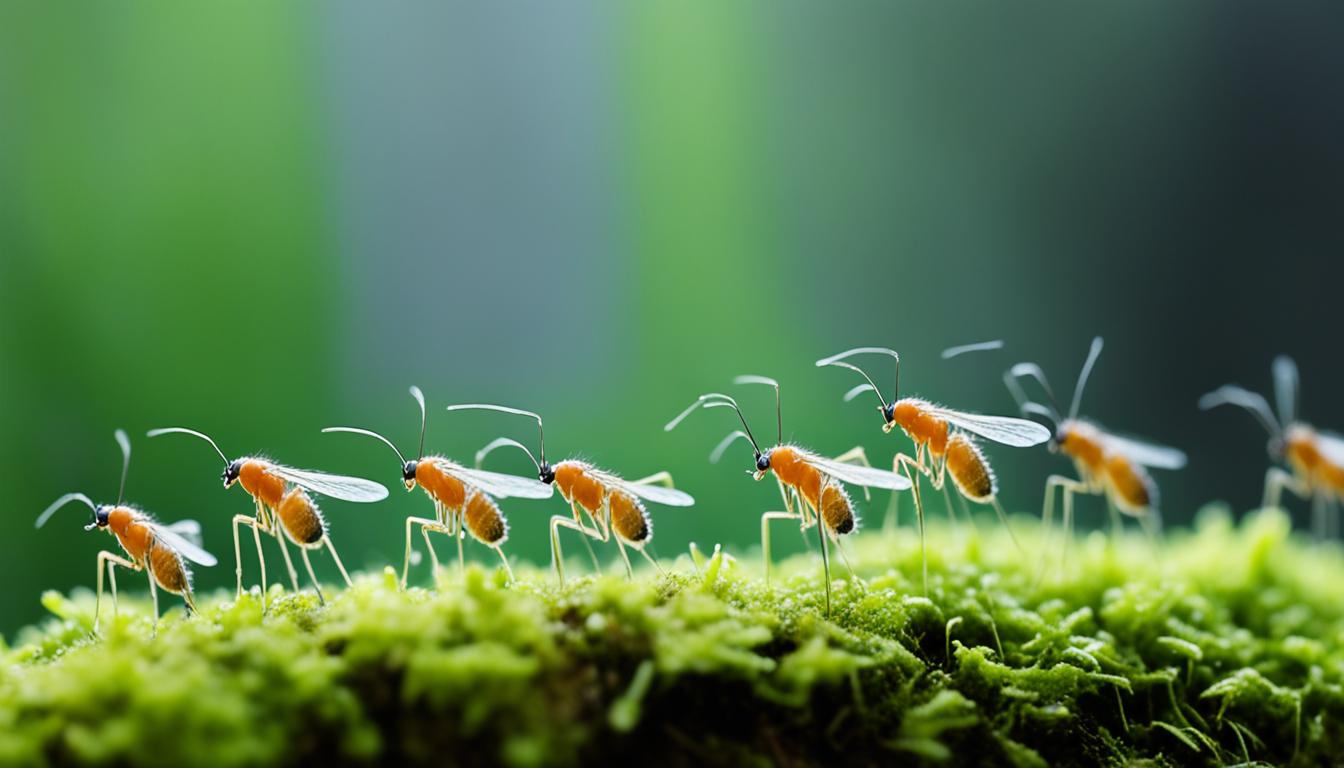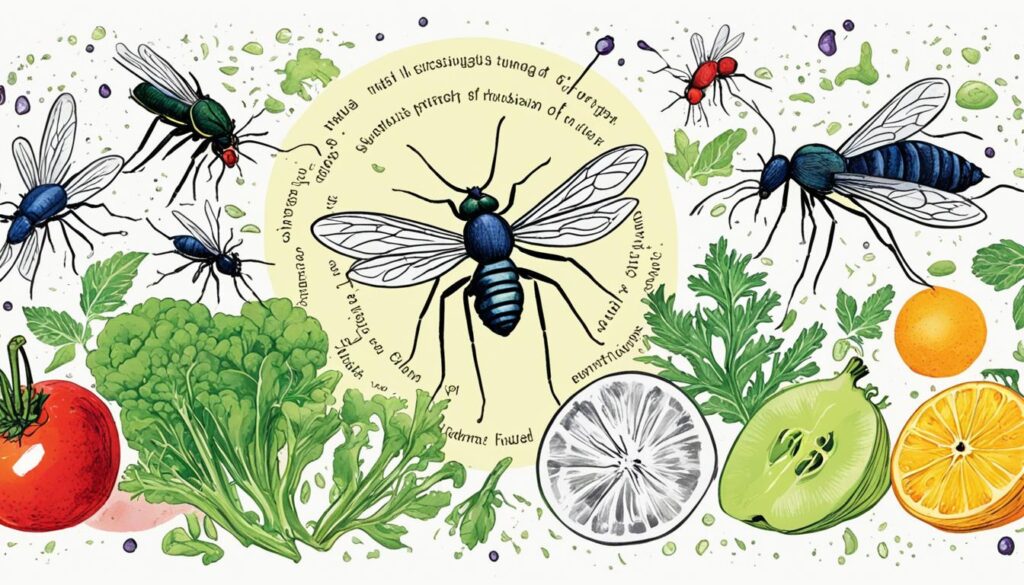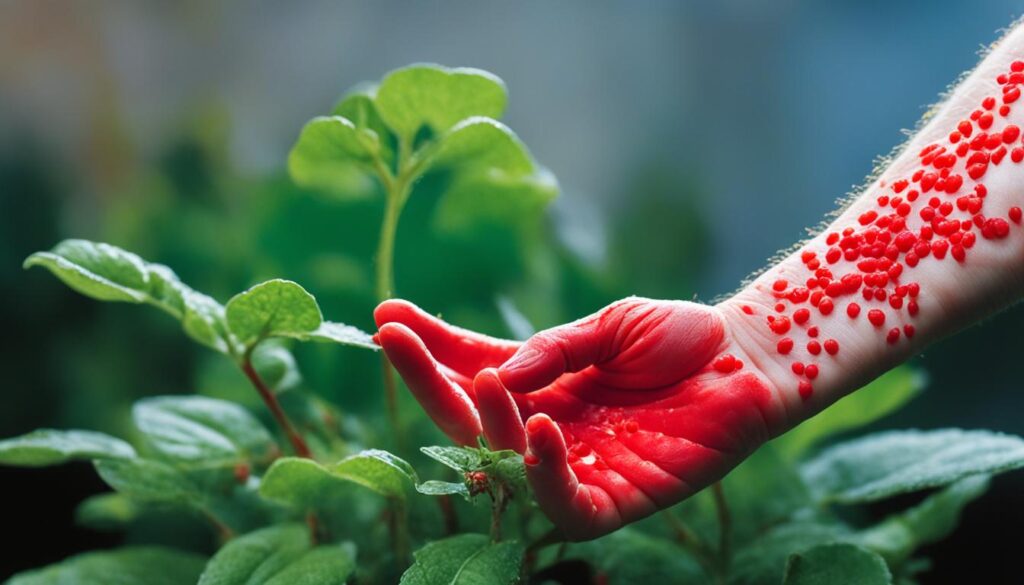
Fungus Gnats’ Impact on Health: Risks Explained
Welcome to our comprehensive guide on the potential health risks associated with fungus gnats. While these tiny insects may seem harmless, they can actually pose several dangers to our well-being. In this article, we will explore the various ways fungus gnats can affect our health, from allergic reactions to respiratory issues and infections.
Key Takeaways:
- Fungus gnats can trigger allergic reactions in some individuals, leading to symptoms like itching, redness, and swelling.
- The presence of fungus gnats can worsen respiratory conditions such as asthma or allergies, causing breathing difficulties and exacerbating symptoms.
- These insects can carry and transmit harmful bacteria and fungi, increasing the risk of infections, especially in individuals with weakened immune systems.
- Prevention measures, such as eliminating breeding grounds and improving indoor air quality, can help minimize the health effects of fungus gnats.
- If a fungus gnat infestation persists or becomes severe, seeking professional assistance is crucial for effective control and mitigation.
Now that we have a better understanding of the potential health risks associated with fungus gnats, let’s delve deeper into the specifics in the following sections.
Understanding the Health Risks of Fungus Gnats
Fungus gnats are often viewed as a nuisance, but their impact extends beyond mere annoyance. These tiny insects can pose significant health hazards and concerns for humans, particularly in indoor environments where they thrive. By understanding the health implications of fungus gnats, we can take proactive measures to protect ourselves and our loved ones.
Allergic Reactions and Respiratory Issues
Fungus gnats are known to trigger allergic reactions in some individuals. When these insects bite or come into contact with the skin, they release certain proteins that can cause itchiness, redness, and swelling. In more severe cases, allergic reactions may lead to hives or even anaphylaxis, a life-threatening condition.
Furthermore, fungus gnats can contribute to respiratory issues, especially for those with pre-existing conditions such as asthma or allergies. The fine hairs on their bodies can be inhaled and irritate the respiratory system, leading to coughing, wheezing, shortness of breath, and chest tightness.
Infections and Health Complications
Fungus gnats are attracted to moist environments, making them common inhabitants of potted plants, damp soil, and areas with water damage. Unfortunately, these insects can carry bacteria and fungi that can cause infections in humans. If a fungus gnat bites or lands on an open wound, it can introduce harmful microorganisms, potentially leading to skin infections or more severe health complications.
Moreover, the presence of fungus gnats can exacerbate existing health conditions. For individuals with weakened immune systems, such as the elderly, children, or those with underlying health issues, the introduction of additional pathogens from fungus gnats can further compromise their overall well-being.
Preventing and Addressing Fungus Gnat Health Concerns
To minimize the health risks associated with fungus gnats, it is crucial to take proactive measures. Here are some practical steps you can take:
- Keep indoor spaces clean and dry, reducing moisture levels that attract fungus gnats.
- Inspect potted plants regularly to identify and eliminate any breeding grounds for these insects.
- Improve ventilation and indoor air quality to discourage fungus gnat infestations.
- Consider natural or chemical control methods, such as sticky traps or insecticides, if the infestation persists.
- Consult a pest control professional for severe or persistent fungus gnat problems.
By being proactive and attentive to the presence of fungus gnats, we can mitigate their health implications and create safer, healthier living environments for ourselves and our families.

Image: Macro photograph of a fungus gnat. Fungus gnats can pose health risks to humans, including allergic reactions, respiratory issues, and the potential for infections.
Minimizing the Health Effects of Fungus Gnats
When it comes to protecting your health from the impact of fungus gnats, prevention is key. By implementing practical steps and control measures, you can minimize the negative consequences associated with these pesky insects. Here are some tips to help you combat fungus gnat infestations:
- Eliminating Breeding Grounds: Fungus gnats thrive in damp environments, so it’s important to address any moisture issues in your home. Fix leaks, ensure proper drainage, and avoid overwatering indoor plants, as standing water can create optimal conditions for these pests to breed.
- Improved Indoor Air Quality: Enhancing ventilation and air circulation can deter fungus gnats. Open windows, use fans, or invest in an air purifier to improve the air quality in your space. This can help reduce their presence and minimize any associated health risks.
- Natural Control Methods: Consider using natural remedies to control fungus gnat populations. Yellow sticky traps, made with non-toxic adhesive, can help capture adult gnats. Additionally, beneficial nematodes, microscopic organisms that prey on fungus gnat larvae, can be introduced to affected soil.
- Chemical Control: If the infestation persists or becomes severe, chemical control may be necessary. Consult with a pest control professional to identify safe and effective pesticides specifically formulated for fungus gnats. Always follow the instructions and take necessary precautions to protect your health and the environment.
“Prevention is key when it comes to protecting your health from fungus gnats. By eliminating breeding grounds, improving indoor air quality, and utilizing control methods, you can minimize their health impact.” – [Your Name], Pest Control Expert
Seeking Professional Assistance
In cases where fungus gnat infestations prove persistent or severe, seeking professional assistance is essential. Pest control experts have the knowledge, experience, and specialized tools to effectively eliminate these pests and mitigate any associated health risks. Don’t hesitate to contact a reputable pest control company if you’re unable to successfully control the infestation on your own.
Remember, taking proactive measures to minimize the health effects of fungus gnats is crucial. By implementing preventive strategies and seeking professional help when needed, you can create a healthier indoor environment for you and your family.

Conclusion
In conclusion, understanding and addressing the health risks associated with fungus gnats is crucial for maintaining a safe and healthy environment. These tiny insects may seem harmless, but they can pose significant risks to our well-being.
Throughout this article, we have explored how fungus gnats can negatively impact our health. From triggering allergic reactions and respiratory issues to potentially causing infections, their presence should not be taken lightly.
To protect yourself and your loved ones, proactive measures for prevention and control are essential. By eliminating breeding grounds, improving indoor air quality, and utilizing effective control methods, you can significantly minimize the health effects of fungus gnats.
If you are dealing with a persistent or severe infestation, seeking professional assistance is highly recommended. Fix Mold Miami offers mold assessments and can provide further guidance on addressing fungus gnat issues. Contact them at 305-465-6653 for expert assistance.




